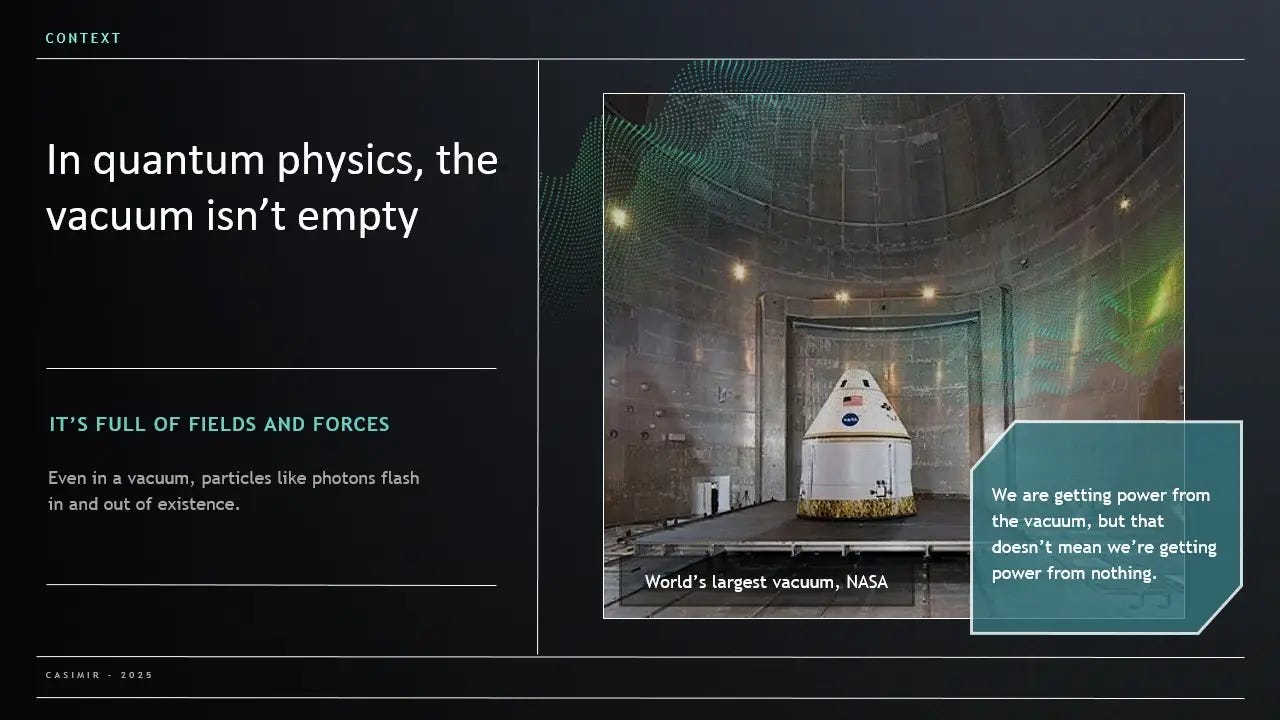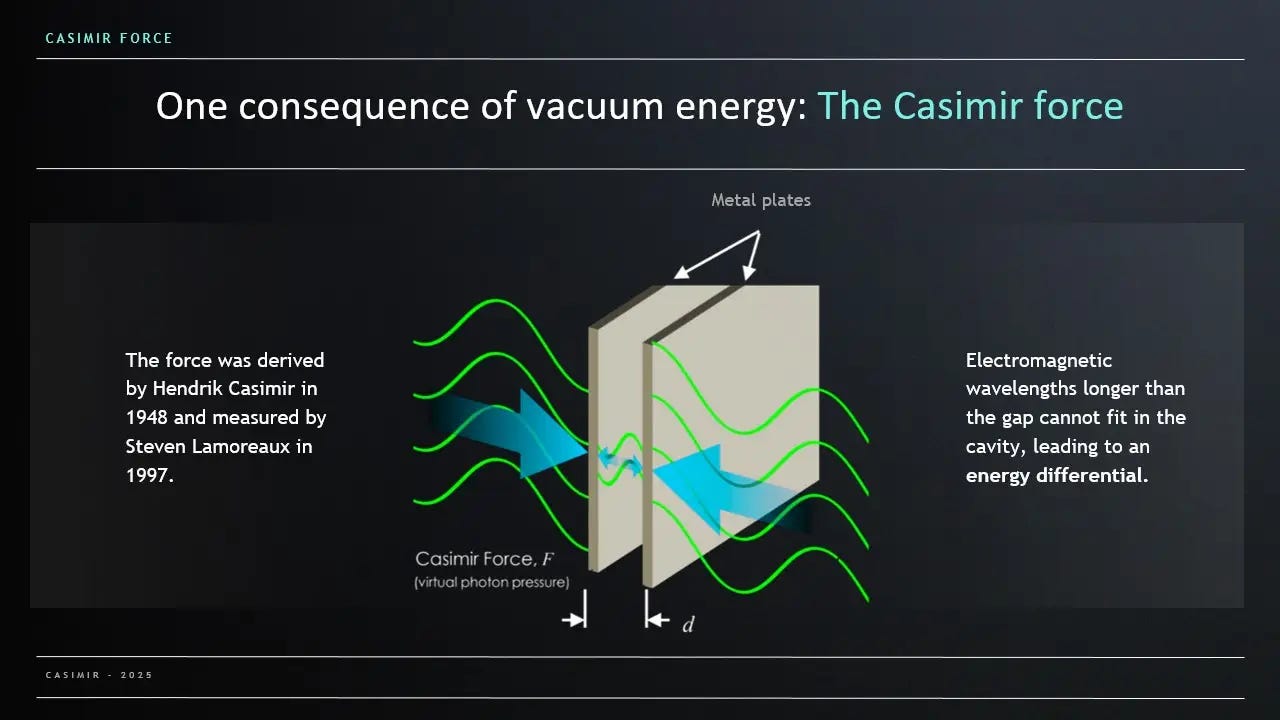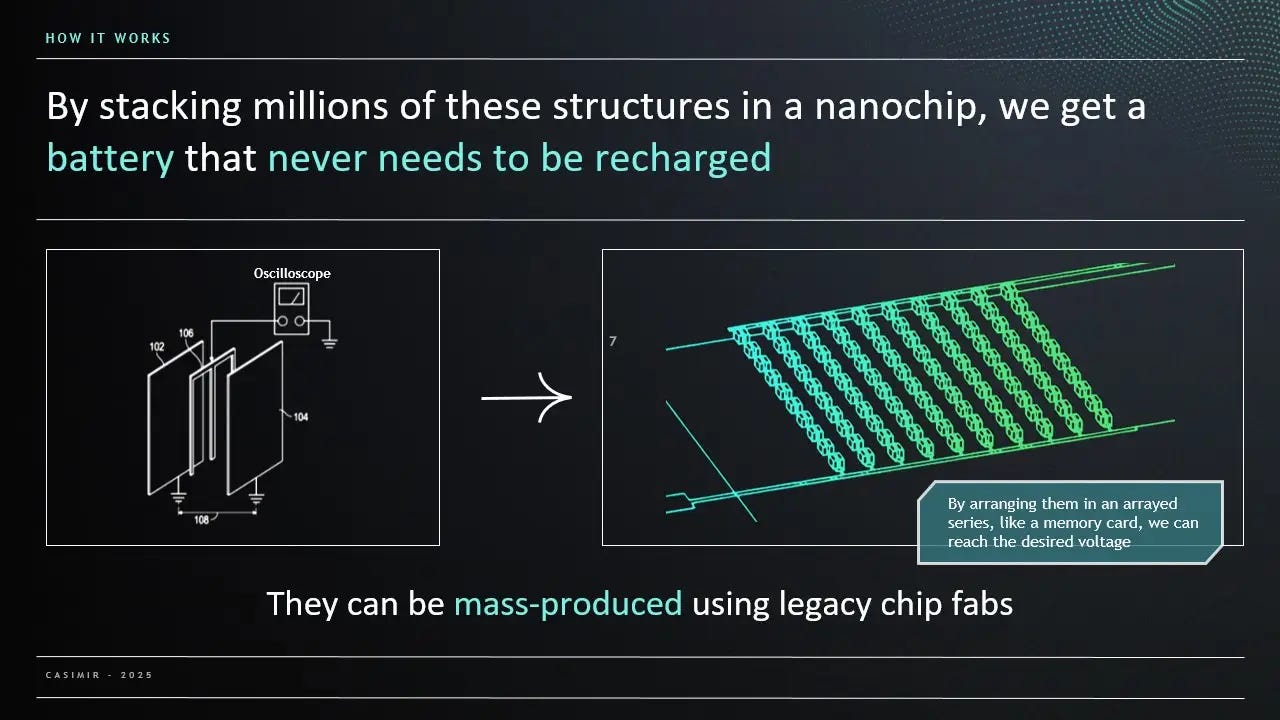The Quantum-Powered Warrior Bands of the Future
Harnessing the Casimir Force for a New Middle Ages
Scientists love to claim that they know everything there is to know about the world, minus one little blurry spot that will be cleared up within the next decade if you just give them more funding.
Lord Kelvin, whose name gives us the Kelvin temperature scale, is said to have expressed this through his possibly apocryphal quote way back in the 1890s: “There is nothing new to be discovered in physics now. All that remains is more and more precise measurement.”
He was wrong, of course. Einstein’s famed papers that launched the twin fields of relativity and quantum mechanics arrived within two decades of Kelvin’s belief that science was over.
And yet the same sentiment is thought today, but is likely to prove just as wrong.
Dr. Harold White and the Casimir Space Company
Enter Dr. Harold White, a former NASA engineer and the founder of the company Casimir Space, a company with ultimate dreams and completed baby steps towards a literal “warp drive” for faster-than-light travel between the stars:
No. The warp drive itself won’t be ready for use anytime soon. But in the meantime, Dr. White’s company is well on its way toward producing something more prosaic, but arguably just about as societally impactful: extracting free energy from space itself.
It’s not a solar panel. It’s not burning or consuming any matter and turning it into energy. It just produces energy from empty space, which is, according to current theories, not really empty:
All physicists, and even many of us, probably know this.
Many scientists, and I, since I took an interest in all this a decade or so ago, know the next part, that because space isn’t really empty, something interesting called the Casimir force produces a measurable effect on the interaction of objects at extremely close proximity. Let’s look at Casimir Space’s own “explanation” of how it all works, taken from their website.
But does anyone really, really know what it means for there to be a “quantum field” pervading every spot in space? Or what a “virtual photon” really is, or why it comes into existence? Or why the imbalance in “virtual photon pressure” can be used to create a voltage potential and electrical current?
Dr. White and his team’s device doesn’t rest on knowing exact answers, let alone comprehensible ones to these questions. Maybe we’ll never know how it works.
Science, without admitting it, has wandered awfully close to metaphysics these days, while simultaneously making it awfully clear that we are also nowhere near the end of science itself.
But Casimir Space Technologies, however, has found a way to turn empty nothingness that isn’t really empty or nothing into useful electrical energy, batteries that never need to be recharged, without really knowing the ultimate how.
There are technical challenges, of course. White’s company is currently only able to produce structures powerful enough to power a pacemaker or a watch, but theoretically could expand the concept far enough to power cell phones, computers, and, stretching a bit, electric cars and individual homes.
Maybe the materials, or chip fabrication, the process to make these Casimir structures, being much like that for computer chips, will be a bottleneck, preventing this technology from really going mainstream.
But let’s play a little with the fun possibilities, shall we?
Casimir Space’s technology is interesting from just the physics direction alone, with the fact that we can, somehow, just do this, shocking everyone I’ve told about this experimental technology.
The mere fact that our background expectations about the universe, the requirements for powering things, our baseline extrapolations of what the laws of thermodynamics and energy conservation mean, etc., that all of these, perhaps, could be wrong, is shocking enough on its own. Speculation on how this technology works alone could fill many books.
But what interests me more, however, is the anthropological and societal impacts, however, of “batteries that never need to be recharged,” assuming they can ultimately be scaled up and reach a reasonable price point as well as the ability to power a home.
The Anthropology of the Casimir Powerbank
Think about a passive box the size of a car or van that sits outside your house and provides you with constant, maintenance, and input-free electrical power. Combine it with a connection to the Starlink satellite network, plug in a dehumidifier or desalination machine or two, or an electric pump powering a well, and you could live a modern industrial lifestyle without ever needing to be “plugged in.”
Extend this a little further, and many of the constraints and pressures that force us to live in society, in cities, and in dependence on a strong centralizing government go away, while the incentives and abilities for people to hold out against such pressure rise higher and higher.
Currently, if the government wants you to pay a tax bill or an electric bill, it’s pretty easy. All they have to do is send you a letter.1
You may hire a tax lawyer, but you will always eventually submit. Because the government knows where you are, it can turn off your power, turn off your water, and, uhh, pick you up at the end of the barrel of a loaded gun if you fail to comply.
Running into the desert wilderness isn’t that much of an option unless you’re willing to give up a modern lifestyle. Eventually, you’ll need to run to town to refuel and resupply. And then they’ll nab you.
The last few centuries of technology, especially that of the early-20th century and its mass tank armies, radio, television, bomber squadrons, and CIA psy-ops, through to even the Internet in some ways, as well as our mutual dependence on complex bureaucracies and high standards of living have been such as to encourage strong governments. It’s produced, or engineered, a populace that like a tagged herd, is easy to manage and track.
But technology does not always encourage such centralization.
The Middle Ages in Europe, as in nearly every age, also the Eurasian Steppe, had technologies that favored weaker, more decentralized governments. The castle favored defense, the horse-archer combination favored small, extremely adept warrior bands over armies of conscripted peasants, and medieval transportation technologies (or the lack thereof) and the threat of raiding bands of pirates, Islamicists, or Steppe barbarians favored the formation and power of local warrior bands over anything regional or national in scope.
A Scenario
If Casimir Space’s ideas for power generation work and are adopted at a mass scale, the future will have a social and political structure far more decentralized and reminiscent of these earlier times than anything with which we’re familiar today.
If you own an electric motorhome powered by a Casimir-esque powerbank, you’d be pretty self-reliant wherever you could ever imagine yourself being anywhere on Earth.
Alaska, Siberia, the Sahara desert, and really anywhere and everywhere on earth suddenly becomes a lot more appealing for those who are tired of, wanted by, or at odds with city-dwellers.
So also enter as options for habitation the cave systems beneath the United States (such as the hundreds of miles below Kentucky’s Mammoth Caves or the thousands of abandoned mines throughout the country.
Undersea living, too, could even be an easy possibility.
Very quickly, the whole idea of the contiguous all-powerful nation state starts to seem a lot more quaint when you don’t really need it for anything and honestly can’t really rely on it if you even happened to want it.
But we’re not imagining a utopia here. Gangs of bandits have access to Casimir powerbanks too. They threatened your neighbors, demanding food and tools, and had to be chased off by your warrior band of local friends. Power is localized because the threats are localized and because the national government, absent the carrots of the electrical grid and the sticks of turning it off, can’t really threaten you.
You’ve moved to Barrow, Alaska, to form a “consecrated birthing community”2 with other Catholic friends from around the United States. Some call it a “network state.” Others call it a cult. You just call it a village.
You grow some crops in the short summers with the aid of “heat coils”, “light-emitters”, and water extracted from the air or melted from the ice. You hunt. You hunt with your neighbors. You craft, and build, and sing with them as well. If you buy something from outside of your community, you either barter or use another technology pushing for decentralization, like Bitcoin, which no government can interfere with or stop you from using.
You know there’s a U.S. President, maybe, but he doesn’t impact your life all that much. You know there’s a governor of, what was it again? Alaska? Or maybe Al-yaska? Your community defines itself more by its faith than by whether it’s more American or Russian in its ethnic roots. Your community is but a few generations of ethnogenesis and a grand epic battle or two, worthy of a new Iliad, against the forces of chaos, before it will become its own new ethnicity or nation state. The numerous, very numerous children of your village portend that you will become something. At the very least, you have a future to hope for.
You’re in the 21st century, and yes, artificial intelligence has caused a lot of problems. You mostly avoid it, like you do with robots and drones. Your community does need a force-shield against incoming drone attacks, but they’re part of the background. You use the Internet a little, but mostly don’t need it, other than to maybe buy a new powerbank or two every few years.
You’re not Amish. You use a lot of electricity. You’ve just realized the dangers, reiterated by Pope Leo XIV3 over many encyclicals, implicit in overattachment to the internet, artificial intelligence, and the like, to the flourishing of human nature.
Yes, mankind has spread beyond Earth. Your cousin is on SpaceX’s colony of Olympus somewhere on Mars. But you didn’t choose to go there personally. SpaceX is a little un-Christian and heterodox at times with some of their philosophies and practices. Going to Mars would also entail your being a little too subject to bureaucracy and arbitrary government than fits your liking. Perhaps when technology improves enough that individual families can have their own rockets, your grandchildren will go. But, you, you are a man of the Earth and the earthy soil, and you look more to Heaven alone than to Heaven and the heavens.
No, nothing is perfect in your life. Nothing is perfectly “safe.” But things are peaceful, mostly, and also exciting, and also very much so, real. You have real agency over your own and your family’s lives.
You are, once again, a free man, a real man.
You cannot rest on your laurels. Rumors abound that a new type of rocketplane can pierce your village’s defenses before countermeasures can be put in place. A victim of bioengineering from the Mormon village nearby is rumored to have been infected with “COVID-55”, something the hilarious propaganda video streams from the “Vancouver People’s Liberation Army” urge you to be vaccinated against.
Maybe the village needs to move to a safer spot? Perhaps the Tasmanian Desert would be better? Or Rhodesia, newly pacified by Lord Miles Jr. and the followers of Maximum Leader
?There are dangers all around, and yet you are alive. Time to praise God for that and pray for His guidance. Time to walk over to the chapel for Vespers…
You are one of the quantum-powered nomads of the future. And you are also a Christian.
History continues, and remains the same.
Modernity is over. Long live the modern tech that could bring us beyond it.
Yes, there is “some” legitimate authority in government: “Render unto Caesar what is Caesar’s… I am not a complete libertarian or anarcho-capitalist. But my politics are Mary’s Magnificat, which does make me anti-establishment to a degree.
See this incredible lecture if you’re interested in this, uhh, odd, phrase:
Of (due to many prayers) blessed memory!













I wish them the best of luck, but they absolutely need to watch their backs. Government has never taken kindly to any attempts at free energy or breaking their infrastructural monopolies.
I'm sorry to say it but...the Casimir devices have not been demonstrated yet, and there is no evidence I could find of this effect even working to produce "free" electricity. I searched far and wide for any paper, or prototype, and couldn't find anything. If anyone has a link to some evidence, ANY evidence, please share it, as this sounds lovely but I'm afraid it's just another "cold fusion" situation until demonstrated otherwise.